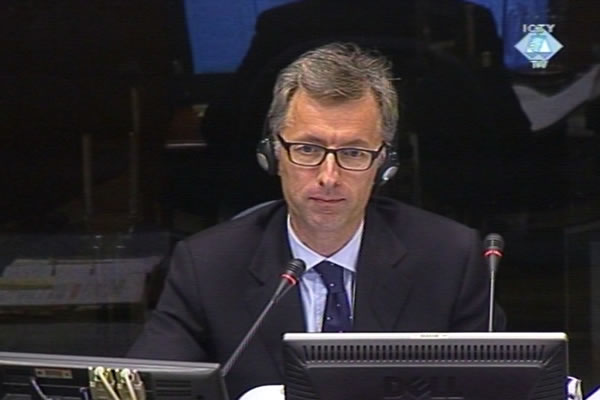Home
PROSECUTION MILITARY EXPERT: ‘GOTOVINA KNEW ABOUT CRIMES’
Belgian military expert Reynaud Theunens contends that Gotovina’s experience from BH meant he was aware that in Operation Storm soldiers under his command could again commit the crimes they had committed in Grahovo and Glamoc. When this indeed happened, Theunens alleges, General Gotovina was regularly informed about all the crimes
 Reynaud Theunens, witness in the Gotovina, Cermak and Markac trial
Reynaud Theunens, witness in the Gotovina, Cermak and Markac trial Prosecution military expert Reynaud Theunens claims that by late July 1995 Ante Gotovina, Split Military District commander, ‘was aware’ that his soldiers might commit crimes in Krajina. During and after Operation Storm, he received regular reports about widespread looting and burning down of houses belonging to the Krajina Serbs who had fled the area. Theunens went on to allege that the military police units were under the command of the accused general. Military police was one of the mechanisms that could have been used to prevent the crimes and to identify and punish the perpetrators from the Croatian Army ranks. Gotovina is charged together with generals Ivan Cermak and Mladen Markac with crimes against Krajina Serbs in the summer and fall of 1995.
The prosecution attached a series of military documents to the witness’s expert report on the structure and operation of the Croatian armed forces. Among those documents is the Operational Logbook containing the minutes taken during the meetings of the Split Military District command in July and August 1995. Entries from late July 1995 note that subordinate officers repeatedly informed Gotovina and his chief of staff Rahim Ademi about the widespread looting and destruction of houses in the towns of Grahovo and Glamoc in BH, captured by the Croatian Army and the HVO units in Operation Summer ’95. As Theunens put it, this meant that even before Operation Strom began Gotovina knew that his subordinate soldiers were keen to loot and burn down houses in villages and towns they took.
Furthermore, the Operational Logbook lists a series of command meetings held in August 1995 where people said that ‘there is looting everywhere’ and that ‘burning down of houses and killing of livestock continues’. At one of those meetings, Gotovina said, ‘the burning down of houses is prohibited and that problem has to be solved urgently’. Gotovina’s deputy ‘appealed for a ban on looting’. Those entries, Theunens concluded, showed Gotovina was aware of the crimes committed all over Krajina after Operation Storm.
A document dated 15 August 1995 was shown today, bearing Gotovina’s signature and saying that ‘military discipline, combat morale of soldiers and command and control of the units’ during and after Operation Storm were at a high level. According to Theunens, this means that the accused general had no problems issuing orders to units and receiving reports from them. So far the prosecutor has been proving that the commander of the Split Military District did nothing to identify and punish perpetrators of crimes in the Croatian Army ranks. One of the mechanisms he could have used to that purpose was the military police. Based on his inspection of Croatian military documents, the prosecution expert concluded that the military police was under general Gotovina’s operative command.
The examination-in chief of the Belgian expert should be completed on Monday. He will then be cross-examined by the defense teams of the three accused.
Linked Reports
- Case : Gotovina et al. - "Operation Storm"
- 2008-11-18 ‘CERMAK DID NOTHING ABOUT CRIME REPORTS’
- 2008-11-17 ARE BARRACKS A LEGITIMATE MILITARY TARGET?
- 2008-11-14 GOTOVINA DEFENSE INVOKES MARTIC AND STRBAC
- 2008-11-24 PROSECUTION: GOTOVINA ‘INCITED’ CRIMES BY DOING NOTHING
- 2008-11-25 ‘OPERATIONAL’ AND ‘PROFESSIONAL’ CHAIN OF COMMAND
- 2008-11-26 DEFENSE DENIES GOTOVINA’S LINK WITH MILITARY POLICE
